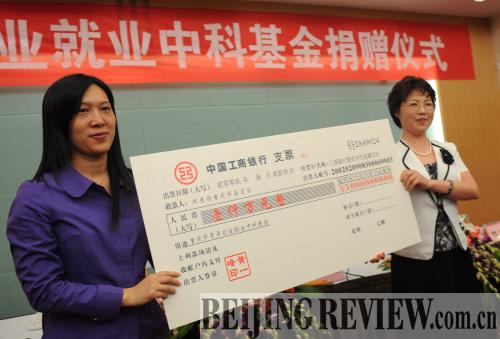|
 |
|
RESPONSIBILITY FIRST: The Chongqing Zhongke Construction Group Co. Ltd., a private real estate developer, recently donated 10 million yuan ($1.46 million) to a local business startup fund (ZHOU HENGYI) |
Chinese enterprises may not be as conscientious of their contributions to society as some would expect.
A recent report from the Chinese Academy of Social Sciences (CASS), issued on October 18, cited a low level of social responsibility for Chinese enterprises. Only one fifth of polled enterprises scored 60 points, the minimum requirement to qualify as a responsible company.
The CASS report stated that the evaluation was based on the performances of nearly 100 top domestic enterprises in the past two years, including 80 state-owned, 11 private and three foreign-funded enterprises. The index consisted of four items: corporate responsibility management, market responsibility, social responsibility and environmental responsibility.
The results were disappointing. Average scores of state-owned, private and foreign-funded enterprises were 33.1 points, 29.6 points and 2.7 points, respectively. None were even close to the passing standard of 60 points.
The report said the social responsibility of enterprises was proportional with their scale. The bigger a company is, the more responsible it feels for society. As evidence, annual revenues of the highest scorers all topped 500 billion yuan ($73.2 billion), while those of the lowest scorers were less than 50 billion yuan ($7.3 billion).
Centrally administered enterprises, with the highest average score of 43.8 points, showed a sound sense of social responsibility, the CASS report stated. This was mainly due to their efficient corporate management and the promotional efforts of their supervisor, the State-Owned Assets Supervision and Administration Commission (SASAC), the report stated. Last year, the SASAC issued a circular requiring central enterprises to honor their social responsibilities and strengthen relevant information disclosure.
In striking contrast, foreign-funded companies lagged far behind in terms of information disclosure about their social responsibilities, according to the report.
Zhong Hongwu, Director of the Research Center of Corporate Social Responsibility under the CASS and one of the compliers of the report, said Chinese companies are less motivated to be more responsible for society. "In addition, we lack an established system to press ahead with the process," said Zhong.
Wang Zhenyao, Director of the Social Welfare and Charity Promotion Department under the Ministry of Civil Affairs, said many enterprises make contributions to disaster relief simply out of sympathy or patriotism. Many are hesitant to ask for publicity to promote their charity, said Wang.
"It is imperative now to improve the information feedback system to better inform the public about donations or other charities of the enterprises," said Wang, adding that this will encourage more companies to assume such responsibilities.
Enterprises should not simply place focus on economic returns, Wang pointed out. "It is their obligation to better serve society, by means such as reducing emissions and protecting the environment," he said.
While raising public awareness about corporate social responsibilities, the CASS report also raised eyebrows. Many questioned the higher scores of state-owned enterprises compared to those in private and foreign-invested sectors.
"Some central enterprises have always been objects of public condemnation for inefficient management and corruption. How can they be top scorers in regard to social responsibility?" questioned a netizen on qianlong.com, the official website of the Beijing Municipal Government, which recently published the CASS report. Among the more than 30,000 online comments on the report, most doubted its credibility.
The CASS said the scores were based on corporate responsibility and financial reports, as well as the websites of the enterprises. But netizens raised doubts about whether the information was reliable.
In response, Zhong said there is still a lack of public understanding about the reference indexes in the report.
"All the enterprises researched in the report were corporate giants with at least 50 billion yuan ($7.3 billion) in annual revenue, so they must have immense social and environmental impacts while gaining enormous profits," said Zhong.
The obstacle, then, is that there is not a unified standard in the world in terms of how corporate social responsibility should be evaluated, said Zhong.
The enterprises should themselves release information about how they have honored their social responsibilities, said Zhong. If they release no information, they will score a zero, he added. | 